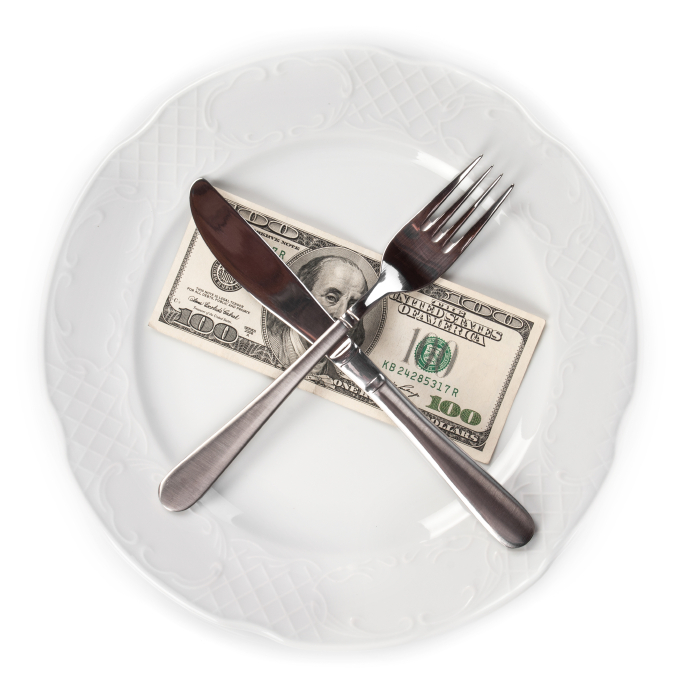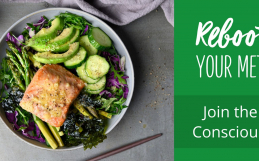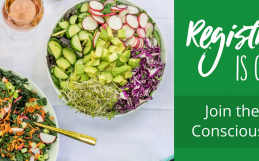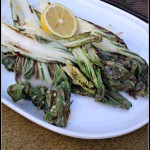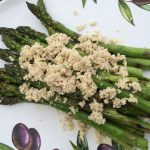If you happen to be new to the Conscious Cleanse, it’s easy to find yourself spending extra time in the kitchen as well as the grocery store filling your cart with all the new ingredients and healthy alternatives. At first glance, eating healthy may seem to be more costly, but today we’re gonna show you how to cleanse on a budget and save yourself some cash.
 For years, I ate almost every meal out. I bought prepackaged convenience snacks, indulged in specialty coffee and tea drinks and only shopped at “Whole Paycheck.” The Thai food takeout driver and I were on a first name basis. My thinking was, “since I’m just one person, it’s cheaper for me to eat out and not waste money and/or food by cooking for just myself.” Turns out, just the opposite was true, not to mention not as healthy.
For years, I ate almost every meal out. I bought prepackaged convenience snacks, indulged in specialty coffee and tea drinks and only shopped at “Whole Paycheck.” The Thai food takeout driver and I were on a first name basis. My thinking was, “since I’m just one person, it’s cheaper for me to eat out and not waste money and/or food by cooking for just myself.” Turns out, just the opposite was true, not to mention not as healthy.
Over the last five years, I’ve learned that in order to make a quantum leap in my health I would have focus on fresh whole foods and prepare most, if not all of my meals at home. These practices not only make me feel good, but they’ve also made my bank account much happier too.
Ready to see how I do it? Below are some of our best tips and tricks to keep the grocery budget in check. Please share with me how you manage to eat healthy on a budget in the comments section below. I’d love to hear your ideas too!
With love and cold-hard cash,
5 Tips to Cleansing on a Budget
Use Online Resources.
When menu planning, make sure to check out your grocery store’s website. Most large grocers post a weekly circular of all the in-store sales online. Whole Foods, for example, publishes “The Whole Deal,” which features sales, recipes, and coupons. Sadly, most clippable coupons are for processed foods, but Whole Foods actually offers coupons for healthful staples such as coconut oil, almond milk, and boxed dried beans.
Another way to tackle your grocery list is to check out home delivery grocery services like King Soopers/City Market or Pea Pod. These sites will let you compile a shopping list online, while giving you a cost that is similar to shopping in-store. By doing this “test run,” you’re able to see what your trip to the store will actually cost. Perhaps trying out that new halibut recipe AND buying all your superfoods in the same week isn’t such a good idea for your wallet.
Buy In Bulk or Whole Foods.
Some grocery stores have bulk sections and this is the place to save money. Here you want to buy all non-gluten grains, dried spices, nuts and seeds since they’re almost always cheaper compared to their boxed counterparts. Organic white quinoa, for example, rings in at $6.99 for 16 ounces while a packaged bag of the same costs $7.49 for only 12 ounces.
A Costco membership can also come in very handy while cleansing! We’ve found great deals on organic greens, organic frozen fruit, dried dates, and organic chicken breasts at this big-box store. As we head into the bountiful summer months, try buying extra in-season produce when it’s ripe and cheap. You can easily bag and freeze it for future months.
Get to Know Your Grocer!
We don’t mean you have to ask that hunky produce guy or gal out for date (although the perks would be marvelous), we only mean to get to know how the store works. Some grocers have double coupon where you’ll benefit from the sales of two overlapping weeks. This can come in very handy when stocking up on organic produce! Other stores, like Whole Foods, will usually give you a discount when you buy produce by the case. Since you’re making green smoothies or fresh juices everyday, you could easily breeze through a case of spinach, bananas or lemons. Another good tip to garner is to find out when your produce department re-stocks. Many stores will weed out soft or bruised fruit (perfect for smoothies!), and sell it at a discount.
Grow your own.
There is no need to be intimidated by gardening! There is also no need to run out and buy a farm. You can start right where you are – whether it’s a windowsill, balcony, backyard plot, or a few pots. If you’re intrigued but don’t know where to start, try growing your own sprouts or herbs. We love fresh herbs like parsley, thyme, oregano, and basil, in so many dishes because they pack such a big punch of flavor (and nutrition). When they’re clipped right from the plant, washed, and sprinkled on food, they’re even more amazing, not to mention a lot more costly! For the cost of a small plastic package of organic thyme, for example, you can buy one packet of approximately 200 seeds. Now, you will have to find some dirt and a planter and wait about 90 days, but then you’ll be able to skip that section of the market completely because you’ll have all the thyme in the world! A few of our favorite sites to research and order seeds are Botanical Interests and Seeds of Change.
Practice Leaf to Root Eating.
Gardens love compost, which is where many of your vegetable and fruit scraps may end up. We challenge you make the most of your produce and see just how far you can stretch that carrot. You may have heard of “Nose to Tail” eating, or the idea where one tries to eat every little bit of the beast. Did you know that you could also practice the same theory with produce? Instead of trashing or composting your zucchini ends, onion husks, and cilantro stems, start collecting them in a gallon bag in the freezer. When the bag is full, make veggie stock! You can do the same thing with apple cores or mango skins for green smoothies or juices. Are you merely squeezing juice from that lemon? Why not zest it first and freeze the zest for later! Once you start thinking in these terms, you’ll be able to see so many lost opportunities for stretching your buck. A few of our new discoveries are putting kale ribs on the grill or making crackers from leftover almond milk pulp.
